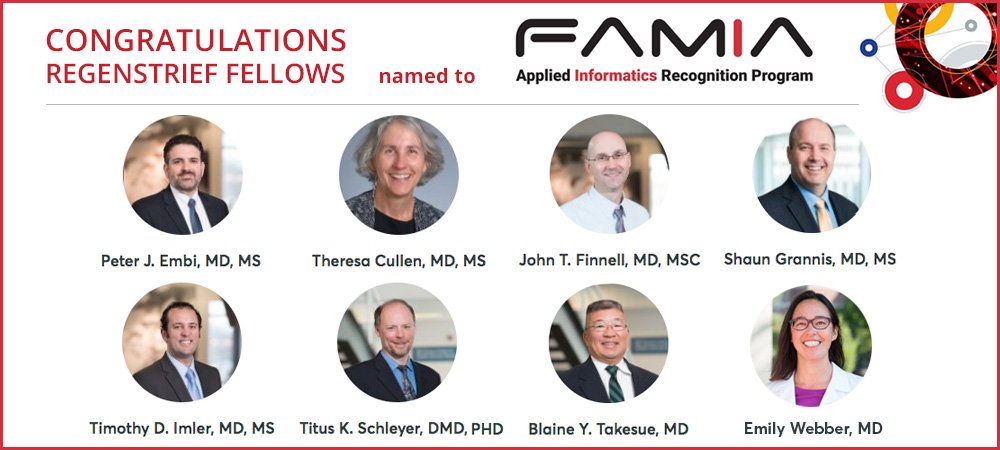Eight scientists, seven Regenstrief Institute faculty members and one affiliated scientist, will be inducted as Fellows of the American Medical Informatics Association. They are part of the first class of the new program. The program recognizes applied informatics professionals who directly impact and improve health care, biomedical research, public health and personal health through the practice of informatics.
The recognition program was launched in May 2018. For nearly three decades, AMIA has led the recognition of individuals making sustained and high impact contributions to the broad field of informatics through its partner organization, the American College of Medical Informatics. FAMIA provides a complementary recognition program for professionals whose impact concerns the implementations and use of informatics and whose contributions are evident in the settings in which they work.
The Regenstrief faculty being recognized include:
Peter Embi, M.D., MS: Dr. Embi is the President and CEO of Regenstrief Institute. He also serves as the AMIA Board Chair. He is an internationally recognized researcher, educator, and leader in the field of clinical and translational research informatics.
Terry Cullen, M.D., MS: Dr. Cullen has worked to develop population health IT software suites since 2002, including electronic clinical quality measures and expanded population health capabilities at the point of care.
John T. (JT) Finnell, M.D., MS: Dr. Finnell is the director of the Clinical Informatics Fellowship Program at Regenstrief. He worked with the U.S. Substance Abuse and Mental Health Services Administration and MITRE Corporation to connect Indiana’s Prescription Drug Monitoring Program to the electronic health record.
Shaun Grannis, M.D., MS: Dr. Grannis is the director for the Center for Biomedical Informatics at Regenstrief Institute. He works closely with national and international population stakeholders to advance the technical infrastructure and data-sharing capabilities in various settings.
Timothy Imler, M.D., MS: Dr. Imler is the medical director of Research Services at Regenstrief Institute. His clinical interests are gastroenterology, colorectal cancer screening and surveillance, and quality improvements in endoscopy.
Titus Schleyer, D.M,D, PhD: Dr. Schleyer’s current research is focused on making information from various sources more accessible in clinicians’ workflows, big data mining for population health management and research, and the development of the Indiana Learning Health Systems Initiative.
Blaine Takesue, M.D.: Dr. Takesue is the technology lead for the Regenstrief Institute/Indiana University School of Medicine partnership with the American Medical Association’s Accelerating Change in Medical Education initiative, for which he leads development of the Regenstrief EHR Clinical Learning Platform (RECLP).
Regenstrief Affiliated Scientist Emily Webber, M.D., was also selected for FAMIA’s inaugural class. She is the chief medical information officer at Riley Children’s Health and associate chief medical informatics officer at Indiana University Health, as well as associate professor of clinical pediatrics at IU School of Medicine.
The new fellows will be inducted into FAMIA at the AMIA 2019 Clinical Informatics Conference in Atlanta, GA in the spring.











